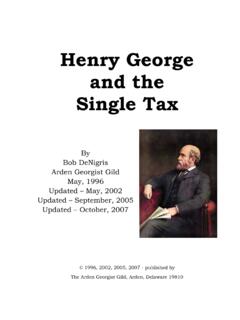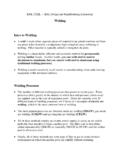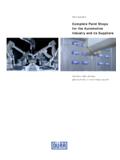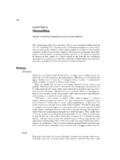Transcription of Resources (or Factors of Production) Are Scarce
1 Resources (or Factors of production ) Are ScarceResourcesInputs used in theproduction of the goodsand services that we called Factors natural Resources thatare available withoutalteration or effort on thepart of humans. Land as aresource includes onlyoriginal fertility andmineral deposits, topogra-phy, climate, water contributions ofhumans who work, whichinvolve both thinking terms are used synonymously,synonymously,synonymously,s ynonymously,synonymously, that suggests thatthey mean the same thing. According to the AmericanHeritage Dictionary, Resources are things that can beused to advantage or available capital; assets. Factorsare things that actively contribute to an accomplishment,result or process. Does the choice of terms indicate aparticular attitude toward the productive process?Certainly the Factors of production are Scarce , in the sense thatone cannot create stuff out of thin air, or accomplish workinstantaneously.
2 But we shouldn t make too much of that when things are considered Scarce , their price goes upand they tend not to go to waste. Yet, the price of labor wages keeps tending downward, so we can t be running out of rate of interest (minus premiums for inflation and risk) hoversbetween 1 and 2%. And every major city has lots of highly valuablepieces of land that are idle, or grossly about location value?Everyone knows that locationis the greatest (as well asthe second and thirdgreatest) determinant ofland value. Here, it is ex-plicitly left out. Hence it isnot surprising that land wouldbe thought of as the leastimportant factor. It brings tomind an interesting question,though: if the value oflocation isn t part of landas a resource then wheredoesdoesdoesdoesdoes it come in?There is fudging going onhere.
3 Labor is defined as theproductive contributions ofhumans who work. The vividexamples in the text leaveus with the impression thatthe labor factor is the people who work fora boss, and collect a paycheck not thosewho make decisions and take risks. Yet thedefinition on the left includes both thinkingand doing. Traditionally, discussion of the Factors of production leads naturally todiscussion of the distributiondistributiondistributiondist ributiondistribution of wealth among those Factors . However,labor s contribution to productive output has been increasing steadily for twocenturies, while wages have tended to fall. You d think that might be worthmentioning here but this text obscures, whenever possible, any logicalconnection between production and scarcity concept just described arises from the existence of Scarce Resources ,or simply Resources , for short.
4 Resources can be defined as the inputs used in theproduction of those things that we desire. When Resources are productive, they aretypically called Factors of production . Indeed, some economists use the terms re-sources and Factors of production synonymously. The total quantity, or stock, ofresources that an economy has determines what that economy can produce. Everyeconomy has, in varying degrees, vast amounts of different Resources , or Factors ofproduction. Factors of production can be classified in many ways. One commonclassification scheme distinguishes natural, human, and manufactured Resources = LAND AND MINERAL DEPOSITSB asically, land with its inherent mineral deposits is the natural resource wethink of most often. The original fertility of land is also a natural resource. Someland can grow phenomenal amounts of crops without any addition of fertilizer;other land is incapable of growing anything in its natural state.
5 Today, some econo-mists contend that natural Resources are often the least important Factors of pro-duction in an economy. They believe that what is more important is the transfor-mation of existing natural Resources into what is truly usable by humans. Thattransformation requires the other types of Resources labor and Resources = LABORIn order to produce the things we desire, a human resource must be human resource consists of the productive contributions of labor made byindividuals who work for example, steelworkers, ballet dancers, and profes-sional baseball players. The contribution of labor to the production process canbe increased. Whenever potential workers obtain schooling and training andwhenever actual workers obtain new skills, labor s contribution to productiveoutput will Resources = CAPITALWhen labor is applied to land to grow corn, for example, something else isused.
6 Usually it is a plow or a tractor. That is to say, land and labor are combinedwith manufactured Resources in order to produce the things that we desire. Thesemanufactured Resources are called capital, which consists of machines, buildings,and tools. Additionally, capital consists of improvements to natural Resources ,such as irrigation is, in effect, a fourth type of input used in production . It is a special type ofhuman resource; it consists of entrepreneurial ability, or entrepreneurship. Entre-preneurship is associated with the founding of new businesses or the introductionof new products and new techniques. But it means more than that: it also encom-passes taking risks (possibly losing large sums of wealth on new ventures), in-venting new methods of doing common things, and generally experimenting withany type of new thinking that could lead to a monetary entrepreneurship, virtually no large-scale business organizationscould operate.
7 Clearly, entrepreneurship as a human resource is Scarce : not ev-eryone is willing to take risks or has the ability for successful business see the classification of Resources in Exhibit Improvements to human Resources are also possible, of course. When this occurs, we say lhathuman capital has been Human Resource = EntrepreneurshipEXHIBIT 1-1 RESOURCE CLASSIFICATION. We can arbitrarilyclassify Resources , or Factors of production , into thosethat are natural, human, and manufactured. We have de-noted specific names within those three andEntrepreneurshipCapitalCapitalAll manufacturedresources, includingbuildings, equipment,machines, and improve-ments to fourth factor ofproduction, involvinghuman Resources thatperform the functions ofraising capital, organizing,managing, assemblingother Factors of produc-tion, and making basicbusiness policy entrepreneur is a from Economics Today by Roger L.
8 Miller, Harper & Row, 5th edition. Commentary by Lindy Davies, Henry George InstituteWhy is the fourth factor emphasized likethis? It gives the impression that entre-preneurship is superior to the other three. Thatconnotation is reinforced in the text:entrepreneurship is a specialspecialspecialspecialspecial kind of humanresource; those who do it are bold, dashingrisk-takers, without whom no large-scalebusiness organizations could operate. Whosays there is no romance in economics?Although there is a huge difference in emphasis, no clearreason is offered for why these characteristics distinguishentrepreneurship from labor. Nevertheless, laborers aresaid to receive wages; entrepreneurs receive profits. Butif labor involves both doing and thinking, as we are toldabove, then why the separation?
9 Why isn tentrepreneurship just the thinking part of labor?Here is a clue to thedifference. The paragraph onlabor above mentionsproductionproductionproductionpr oductionproduction five times. Laborproducesproducesproducesproducespro duces the wealth thatmakes the economy go. Odd,then, that the entrepreneur stask is to think of things thatcould lead to a monetarybenefit. Could it be thatsome of these monetarybenefits do notdo notdo notdo notdo not come fromproduction? One veryimportant example of thatis the location value of land which, as we saw, thistext has carefully excisedfrom the definition of land asa factor of production !We could also arbitrarilyarbitrarilyarbitrarilyarbitra rilyarbitrarily classify Factors into those that are wet, dry or three-factor scheme is not arbitrary; land, labor and capital are clearlyseparable, mutually exclusive sets.
10 That makes them suitable for discussing thedistribution of wealth in society. Here, we have a very different scheme of things,in which the productive Factors exist in order to be manipulated by profit-maximizing entrepreneurs. (Hence the shadowy implication that labor humancapital isisisisis the laborer.) The four-factor scheme isn t arbitrary either; it s ideallysuited to analyzing micro-economic choices. But it cannot cannot cannot cannot cannot help us to understandthe distribution of wealth, and find the cause of t entrepreneurs provide the initiative and courage tomove the economy forward? So why vilify them? Ah, butdo land speculators boldly move the economy forward, orselfishly retard it? By confounding seemingly onpurpose the legitimately-earned wages of workerswith the passively-collected gains of land-holders, thistextbook gives entrepreneurs a bad name!








